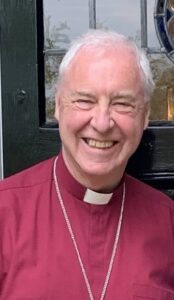 Our Alumnx Council meets bi-monthly, and, as part of our closing practices each meeting, we invite a member of the Council to share a personal reflection, “This I Believe.” This month’s reflection comes from Christopher Lowson, who graduated PSR with a STM (now known as the MTS) in 1978. Lowson was awarded a World Council of Churches’ scholarship to study at PSR and previously studied Theology at King’s College in London from 1972-76. After graduating, Lowson was ordained a deacon (1977), priest (1978), and eventually a bishop in 2011. Lowson served in a variety of ministerial roles during that period in London, Hampshire, and Lincoln.
Our Alumnx Council meets bi-monthly, and, as part of our closing practices each meeting, we invite a member of the Council to share a personal reflection, “This I Believe.” This month’s reflection comes from Christopher Lowson, who graduated PSR with a STM (now known as the MTS) in 1978. Lowson was awarded a World Council of Churches’ scholarship to study at PSR and previously studied Theology at King’s College in London from 1972-76. After graduating, Lowson was ordained a deacon (1977), priest (1978), and eventually a bishop in 2011. Lowson served in a variety of ministerial roles during that period in London, Hampshire, and Lincoln.
We in the United Kingdom and the United States live in challenging times. Times when the values that we have understood and shared across most of the western world have been turned upside down. Reflecting on what I believe in this changing context, I’d like to share two formative experiences from much earlier in my life. It was Soren Kirkegaard, the Danish philosopher, who said: “Life is lived forward but understood backwards,” and, for me, these two experiences may be examples of that.
The first experience took place in the chapel of PSR on Christmastide 1976.
“To learn to be human is the reason I follow this star.” These are words I first heard spoken in the chapel when my wife and I participated in a production of W.H. Auden’s verse drama, Christmas Oratorio. This was directed by Professor Wayne Rood with, on this occasion, the key role of the narrator spoken by the School’s President, Dr. Davie Napier. And these words were spoken by one of the Magi as they described their long journey to see the infant Jesus. “To learn to be human is the reason I follow this star.”
This is a crisp evocation of what I believe to be the vocation of every human being who has been given life by God and who travels in this life on their journey towards fulfilment. In fact, it is the vocation of all persons of a faith and persons of no faith. But for me, formed within the Christian tradition, this insight is dressed in the clothes of incarnation, redemption and sanctification expressed by God though Jesus Christ. In short, we are called to become who we already are.
The second experience took place a couple of years later at St. Matthias Church on Richmond Hill in South-west London in Christmas 1978.
When I was a curate (what you might call an associate pastor), I persuaded an exceptionally fine theatre company to come and perform TS Eliot’s play Murder in the Cathedral for a week in one of the churches in which I served. Of course, staging this caused chaos. There was stage setting and raised seating on scaffolding and lighting rigs everywhere, and the Sunday services had to be re-shaped to make this happen. When I look back now, the senior pastor and the regular attenders were very patient with the new curate, full of ideas. Some were good, others not so good.
But this turned out to be a good one. It drew thousands of people (it was an exam text for High School that year), and I got to sit at the back of the gallery every night for the rehearsals and performances which meant that I got to know the words very well. It is undoubtedly a great play and the part of the play that affected me most was not the obvious bit (the surprising ending when the knights who had murdered Thomas a Becket in his own cathedral return to explain to a shocked audience why they did it).
No, the words I remember most were those of Becket’s Christmas sermon delivered a few days before the murder. The archbishop said this:
Reflect now, how Our Lord Himself spoke of Peace. He said to His disciples: “My peace I leave with you; my peace I give unto you.” Did He mean peace as we think of it: the kingdom of England at peace with its neighbors, the barons at peace with the King, the householder counting over his peaceful gains, the swept hearth, his best wine for a friend at the table, his wife singing to the children?
Those men His disciples knew no such things: they went forth to journey afar, to suffer by land and sea, to know torture, imprisonment, disappointment, to suffer death by martyrdom. What then did He mean? If you ask that, remember that He said also, “Not as the world giveth, give I unto you.” So then, He gave to his disciples peace, but not peace as the world gives.
I was discovering that the Jesus of my childhood, which at best could be described a dose of anesthetic against the horrors of our world, would not do.
I was learning that all God’s children are called to follow our Lord where he leads, even if this means entering his suffering and death. But we are called to move through that into his resurrection. A resurrection life in which where the risen Christ always speaks to his earthly followers of Peace, of Shalom: of peace with God, peace within the world, and peace with our sisters and brothers.
I was learning that are not called in to follow the meek and mild Jesus of my childhood and my Children’s Bible; that we are not called into a sanitized world in which everything is lovely (and perhaps naïve)… but we are called to follow in the footsteps of Jesus in the hope, and by God’s grace, of becoming human and becoming the person God made us to be.
You and I are called to be human, but not human in the terms of the worldly success, popularity, or agency. We are called to be human as it was perfectly expressed in Jesus Christ and in him crucified and risen.
This is an inclusive expression of God’s love for the world, and this is what I believe…
